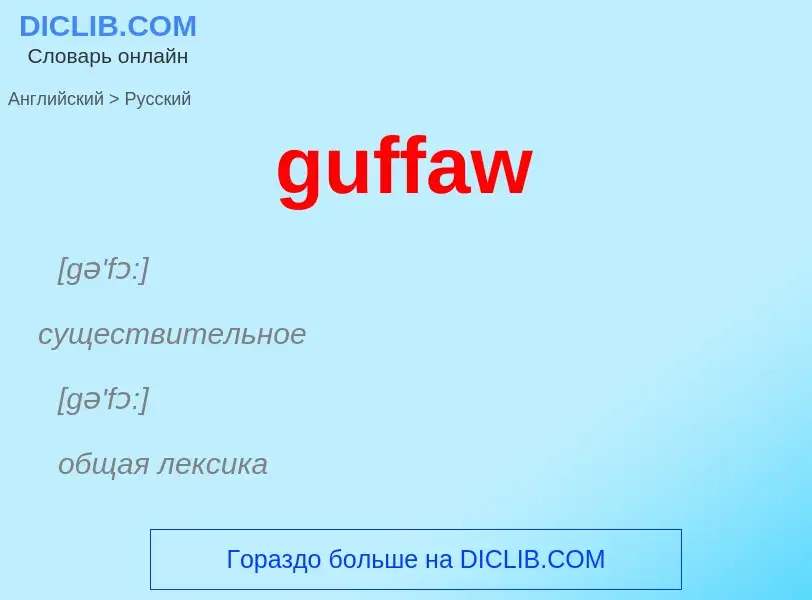Vertaling en analyse van woorden door kunstmatige intelligentie ChatGPT
Op deze pagina kunt u een gedetailleerde analyse krijgen van een woord of zin, geproduceerd met behulp van de beste kunstmatige intelligentietechnologie tot nu toe:
- hoe het woord wordt gebruikt
- gebruiksfrequentie
- het wordt vaker gebruikt in mondelinge of schriftelijke toespraken
- opties voor woordvertaling
- Gebruiksvoorbeelden (meerdere zinnen met vertaling)
- etymologie
guffaw - vertaling naar russisch
[gə'fɔ:]
существительное
[gə'fɔ:]
общая лексика
грубый хохот
гогот
синоним
глагол
общая лексика
грубо хохотать
гоготать
сказать (что-л.) с грубым смехом
синоним
Wikipedia

Laughter is a pleasant physical reaction and emotion consisting usually of rhythmical, often audible contractions of the diaphragm and other parts of the respiratory system. It is a response to certain external or internal stimuli. Laughter can rise from such activities as being tickled, or from humorous stories or thoughts. Most commonly, it is considered an auditory expression of a number of positive emotional states, such as joy, mirth, happiness, or relief. On some occasions, however, it may be caused by contrary emotional states such as embarrassment, surprise, or confusion such as nervous laughter or courtesy laugh. Age, gender, education, language, and culture are all indicators as to whether a person will experience laughter in a given situation. Some other species of primate (chimpanzees, gorillas and orangutans) show laughter-like vocalizations in response to physical contact such as wrestling, play chasing or tickling.
Laughter is a part of human behavior regulated by the brain, helping humans clarify their intentions in social interaction and providing an emotional context to conversations. Laughter is used as a signal for being part of a group—it signals acceptance and positive interactions with others. Laughter is sometimes seen as contagious, and the laughter of one person can itself provoke laughter from others as a positive feedback.
The study of humor and laughter, and its psychological and physiological effects on the human body, is called gelotology.



![''Two laughing men'' by [[Hans von Aachen]], circa 1574 ''Two laughing men'' by [[Hans von Aachen]], circa 1574](https://commons.wikimedia.org/wiki/Special:FilePath/Hans von Aachen - Two Laughing Men (Self-portrait).jpg?width=200)
![Comedian [[Harold Lloyd]] laughing. Comedian [[Harold Lloyd]] laughing.](https://commons.wikimedia.org/wiki/Special:FilePath/Harold Lloyd Portrait in Who's Who on the Screen.jpg?width=200)

![Laughter is a common response to [[tickling]] Laughter is a common response to [[tickling]]](https://commons.wikimedia.org/wiki/Special:FilePath/Laughter by David Shankbone.jpg?width=200)
